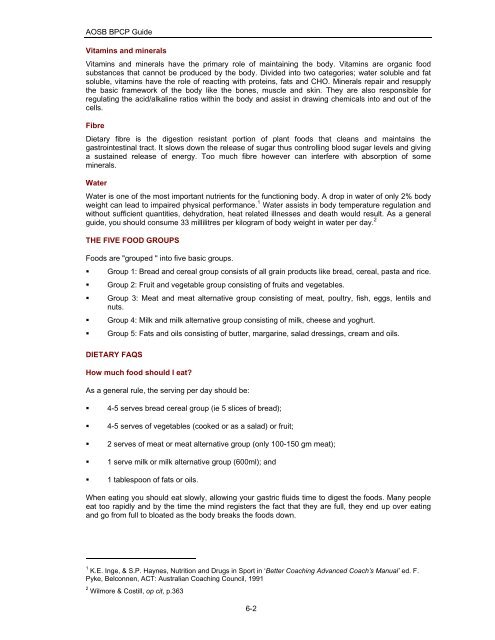Duntroon Army Officer Selection - Australian Army
Duntroon Army Officer Selection - Australian Army
Duntroon Army Officer Selection - Australian Army
Create successful ePaper yourself
Turn your PDF publications into a flip-book with our unique Google optimized e-Paper software.
AOSB BPCP Guide<br />
Vitamins and minerals<br />
Vitamins and minerals have the primary role of maintaining the body. Vitamins are organic food<br />
substances that cannot be produced by the body. Divided into two categories; water soluble and fat<br />
soluble, vitamins have the role of reacting with proteins, fats and CHO. Minerals repair and resupply<br />
the basic framework of the body like the bones, muscle and skin. They are also responsible for<br />
regulating the acid/alkaline ratios within the body and assist in drawing chemicals into and out of the<br />
cells.<br />
Fibre<br />
Dietary fibre is the digestion resistant portion of plant foods that cleans and maintains the<br />
gastrointestinal tract. It slows down the release of sugar thus controlling blood sugar levels and giving<br />
a sustained release of energy. Too much fibre however can interfere with absorption of some<br />
minerals.<br />
Water<br />
Water is one of the most important nutrients for the functioning body. A drop in water of only 2% body<br />
weight can lead to impaired physical performance. 1 Water assists in body temperature regulation and<br />
without sufficient quantities, dehydration, heat related illnesses and death would result. As a general<br />
guide, you should consume 33 millilitres per kilogram of body weight in water per day. 2<br />
THE FIVE FOOD GROUPS<br />
Foods are "grouped " into five basic groups.<br />
Group 1: Bread and cereal group consists of all grain products like bread, cereal, pasta and rice.<br />
Group 2: Fruit and vegetable group consisting of fruits and vegetables.<br />
Group 3: Meat and meat alternative group consisting of meat, poultry, fish, eggs, lentils and<br />
nuts.<br />
Group 4: Milk and milk alternative group consisting of milk, cheese and yoghurt.<br />
Group 5: Fats and oils consisting of butter, margarine, salad dressings, cream and oils.<br />
DIETARY FAQS<br />
How much food should I eat?<br />
As a general rule, the serving per day should be:<br />
4-5 serves bread cereal group (ie 5 slices of bread);<br />
4-5 serves of vegetables (cooked or as a salad) or fruit;<br />
2 serves of meat or meat alternative group (only 100-150 gm meat);<br />
1 serve milk or milk alternative group (600ml); and<br />
1 tablespoon of fats or oils.<br />
When eating you should eat slowly, allowing your gastric fluids time to digest the foods. Many people<br />
eat too rapidly and by the time the mind registers the fact that they are full, they end up over eating<br />
and go from full to bloated as the body breaks the foods down.<br />
1<br />
K.E. Inge, & S.P. Haynes, Nutrition and Drugs in Sport in ‘Better Coaching Advanced Coach’s Manual’ ed. F.<br />
Pyke, Belconnen, ACT: <strong>Australian</strong> Coaching Council, 1991<br />
2<br />
Wilmore & Costill, op cit, p.363<br />
6-2

















